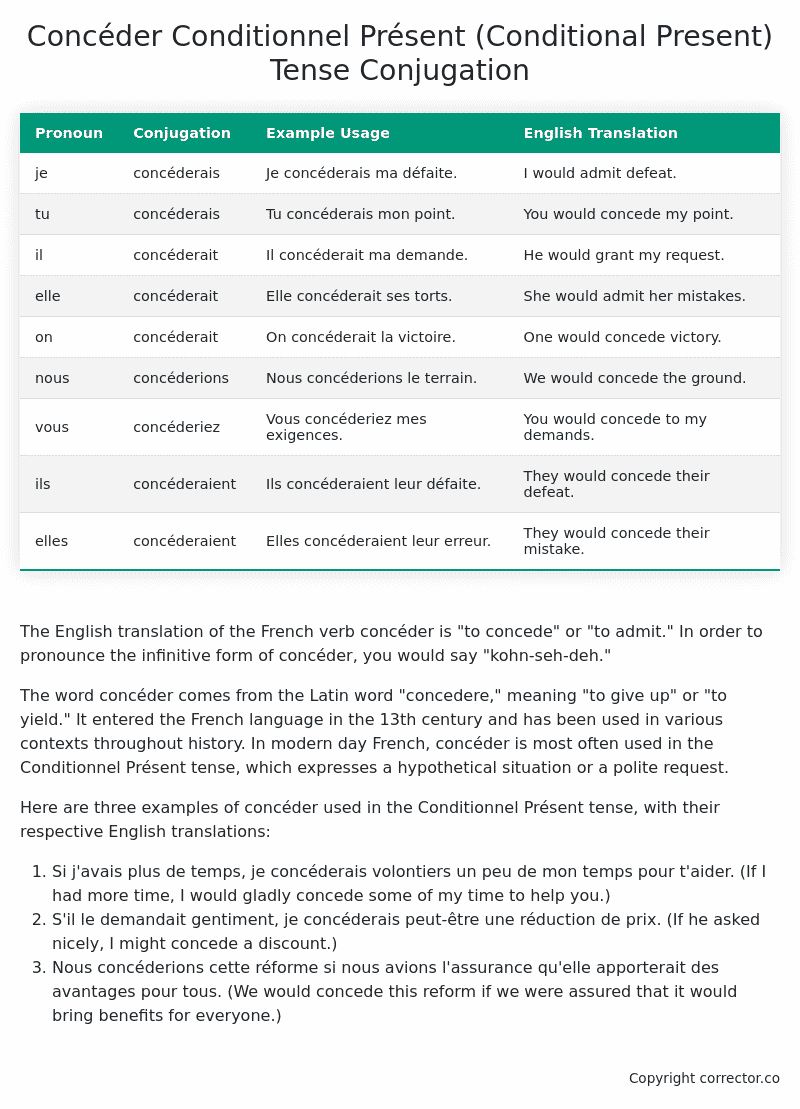Conditionnel Présent (Conditional Present) Tense Conjugation of the French Verb concéder
Introduction to the verb concéder
The English translation of the French verb concéder is “to concede” or “to admit.” In order to pronounce the infinitive form of concéder, you would say “kohn-seh-deh.”
The word concéder comes from the Latin word “concedere,” meaning “to give up” or “to yield.” It entered the French language in the 13th century and has been used in various contexts throughout history. In modern day French, concéder is most often used in the Conditionnel Présent tense, which expresses a hypothetical situation or a polite request.
Here are three examples of concéder used in the Conditionnel Présent tense, with their respective English translations:
- Si j’avais plus de temps, je concéderais volontiers un peu de mon temps pour t’aider. (If I had more time, I would gladly concede some of my time to help you.)
- S’il le demandait gentiment, je concéderais peut-être une réduction de prix. (If he asked nicely, I might concede a discount.)
- Nous concéderions cette réforme si nous avions l’assurance qu’elle apporterait des avantages pour tous. (We would concede this reform if we were assured that it would bring benefits for everyone.)
Table of the Conditionnel Présent (Conditional Present) Tense Conjugation of concéder
| Pronoun | Conjugation | Example Usage | English Translation |
|---|---|---|---|
| je | concéderais | Je concéderais ma défaite. | I would admit defeat. |
| tu | concéderais | Tu concéderais mon point. | You would concede my point. |
| il | concéderait | Il concéderait ma demande. | He would grant my request. |
| elle | concéderait | Elle concéderait ses torts. | She would admit her mistakes. |
| on | concéderait | On concéderait la victoire. | One would concede victory. |
| nous | concéderions | Nous concéderions le terrain. | We would concede the ground. |
| vous | concéderiez | Vous concéderiez mes exigences. | You would concede to my demands. |
| ils | concéderaient | Ils concéderaient leur défaite. | They would concede their defeat. |
| elles | concéderaient | Elles concéderaient leur erreur. | They would concede their mistake. |
Other Conjugations for Concéder.
Le Present (Present Tense) Conjugation of the French Verb concéder
Imparfait (Imperfect) Tense Conjugation of the French Verb concéder
Passé Simple (Simple Past) Tense Conjugation of the French Verb concéder
Passé Composé (Present Perfect) Tense Conjugation of the French Verb concéder
Futur Simple (Simple Future) Tense Conjugation of the French Verb concéder
Futur Proche (Near Future) Tense Conjugation of the French Verb concéder
Plus-que-parfait (Pluperfect) Tense Conjugation of the French Verb concéder
Passé Antérieur (Past Anterior) Tense Conjugation of the French Verb concéder
Futur Antérieur (Future Anterior) Tense Conjugation of the French Verb concéder
Subjonctif Présent (Subjunctive Present) Tense Conjugation of the French Verb concéder
Subjonctif Passé (Subjunctive Past) Tense Conjugation of the French Verb concéder
Subjonctif Imparfait (Subjunctive Imperfect) Tense Conjugation of the French Verb concéder
Subjonctif Plus-que-parfait (Subjunctive Pluperfect) Tense Conjugation of the French Verb concéder
Conditionnel Présent (Conditional Present) Tense Conjugation of the French Verb concéder (this article)
Conditionnel Passé (Conditional Past) Tense Conjugation of the French Verb concéder
L’impératif Présent (Imperative Present) Tense Conjugation of the French Verb concéder
L’infinitif Présent (Infinitive Present) Tense Conjugation of the French Verb concéder
Struggling with French verbs or the language in general? Why not use our free French Grammar Checker – no registration required!
Get a FREE Download Study Sheet of this Conjugation 🔥
Simply right click the image below, click “save image” and get your free reference for the concéder Conditionnel Présent tense conjugation!

Concéder – About the French Conditionnel Présent (Conditional Present) Tense
Formation
Common Everyday Usage Patterns
Expressing Polite Requests
Expressing Hypothetical Situations
Expressing Doubt or Uncertainty
Interactions with Other Tenses
Present Tense
Past Tense
Future Tense
Conditional Perfect
Summary
Want More?
I hope you enjoyed this article on the verb concéder. Still in a learning mood? Check out another TOTALLY random French verb conjugation!


